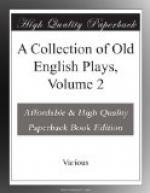Buf. Faythe, very littill, Sir, in sober sadnes, For there disorder hurryes perfect thyngs To mere confussyon; nothing there hath forme But that which spoyles all forme, & to be shorte Vice only thrives & merrytt starves in courte.
Rei. What of the
maryadge of your noble aunte
Oure fayre eied royall empresse?
Buf. Trothe I wonderd, Sir, You spooke of that no sooner, yet I hope None here are jealyous that I brought one sparke To kyndell that ill flame.
Orl. No, of my
trothe,
I knowe thee much too honest;
but how fares
The Empresse now, my dear
exequetresse?
Buf. Sir, as a
woman in her casse may doe;
Shee’s broughte [to]
bedd.
Rei. What, has she a chylde then?
Buf. I, my Lord.
Orl. A Sonne?
Buf. Mys-fortune hathe inspyrd you, Sir; tys true.
Orl. Nay when
my fortune faylls me at a pynche
I will thynke blasphemy a
deede of merrytt.
—O harte, will
nothing breake the?
Rei. Tis most straunge.
Orl. Straunge? not a whytt. Why, if she had beene spayd And all mankynd made Euenucks, yet in spyght My ill fate would have gotten her with chylde— Of a son too. Hencefourthe let no man That hathe a projecte he dothe wishe to thryve Ere let me knowe it. My mere knowledge in’t Would tourne the hope’t successe to an event That would fryghte nature, & make patyence braule With the most pleasinge obiecte.
Buf. Sir, be at
peace;
Much may be found by observatyon.
Orl. Th’arte bothe unfriendlie & uncharytable. Thys observation thou advysest to Would ryvett so my thoughts uppon my fate That I should be distrackt. I can observe Naughte but varyetye of mysseries Crossynge my byrthe, my blood and best endevours. I neare did good for any but great Charles, And the meare doing that hath still brought fourth To me some plague too heavye to be borne, But that I am reserud onlye to teach The studyed envye of mallignant starrs. If fortune be blynde, as the poetts houlde, It is with studyinge myne afflictions: But, for her standing on a roullinge stone, Theare learninge faylls theym, for she fixed stands And onlye against me.
I may perhaps be tempted to print this play in full. The MS. has suffered somewhat, many lines having been cut away at the foot of some of the pages. Although the first scene is marked Act 2, Scene 2,[282] the play seemed to me to be complete. On the last leaf is written “Nella [Greek: phdphnr] la B.” Some name is possibly concealed under these enigmatic letters; but the riddle would defy an Oedipus.




